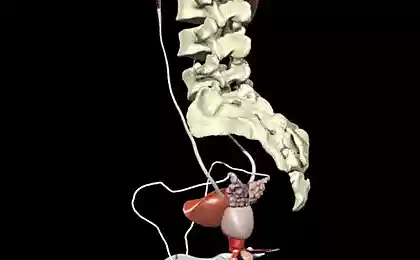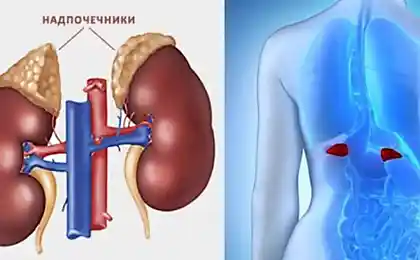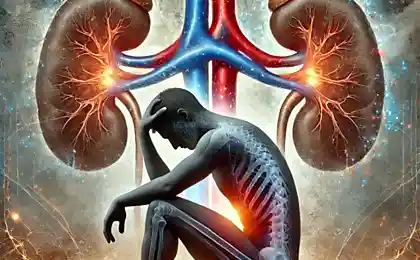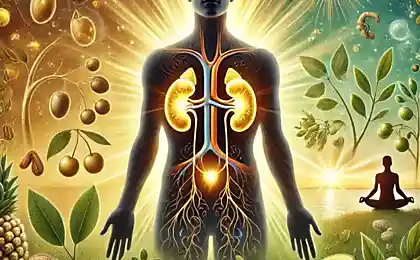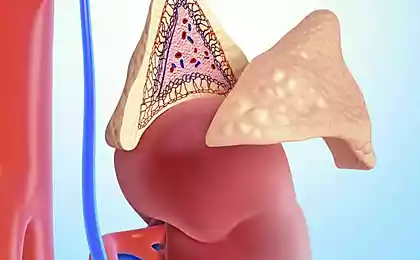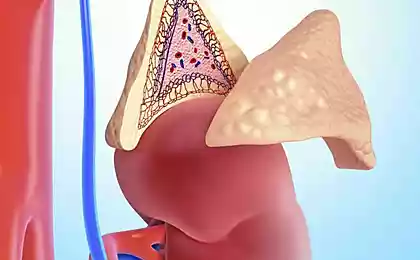311
Adrenal glands: culprits of fear and fatigue?

Health ecology. Excess weight is associated with poor nutrition, and fatigue with a busy schedule of life. However, often we do not notice the true culprits of our problems - the adrenal glands, small glands that regulate our reactions to stress and affect the overall energy of the body.
What are the adrenal glands and why are they so important?
The adrenal glands are small triangular-shaped endocrine glands located above the upper pole of each kidney. Despite their modest size (only 4-6 cm in length), they play an exceptional role in the functioning of our body, producing hormones necessary for the regulation of many physiological processes.
Each adrenal gland consists of two parts with different functions:
- Cortical matter (cortex) - produces steroid hormones, including cortisol, aldosterone and sex hormones.
- Brain matter It produces catecholamines (adrenaline and norepinephrine), which play a central role in the fight-or-flight mechanism.
When we are faced with a threat, whether it is real physical danger or emotional stress, our brain signals to the adrenal glands through the hypothalamic-pituitary-adrenal axis. In response, the adrenal glands release adrenaline and cortisol into the bloodstream, preparing the body for emergency actions.
“The adrenal glands act as faithful guardians of your survival. When they are healthy, they turn on only when it is really necessary, and turn off when the danger has passed. But in today’s world of endless stress, they often work for wear and tear without the possibility of recovery.”
In primitive times, stressful situations were short-lived and had a clear resolution - either successful escape or victory over danger. In the modern world, we are constantly in a state of chronic stress, which leads to continuous activation of our adrenal glands.
Adrenal fatigue: when guards are exhausted
Adrenal Fatigue Syndrome (or adrenal insufficiency) is a condition in which the adrenal glands cannot adequately respond to constant stress and gradually lose the ability to produce hormones in the right amount.

The main signs of adrenal depletion include:
- Chronic fatigue, especially in the morning and mid-day
- Difficulty waking up even after full sleep
- Unexplained headaches
- Decreased immunity and frequent colds
- Craving for salty or sweet foods
- Increased anxiety and irritability
- Problems with concentration
- Unstable blood sugar levels
- Weight gain, especially in the stomach
In today’s world, we are exposed to many stressors, from information overload and financial difficulties to toxic relationships and environmental pollution. Our adrenal glands respond to any stress in the same way - by releasing stress hormones.
When stress becomes chronic, the adrenal glands work to their limits, ultimately leading to their depletion. With prolonged activation of the stress system, the natural daily rhythm of cortisol production is disturbed, which negatively affects many processes in the body.
Studies show that disruption of the circadian rhythm of cortisol is associated with a wide range of problems, including sleep disorders, decreased immunity, metabolic disorders, and even depression.
Adrenal glands and excess weight: an unobvious link
Many people suffering from problems with the adrenal glands, note an incomprehensible weight gain, especially in the abdomen. This is not accidental - elevated cortisol levels are directly related to the accumulation of visceral fat.
Cortisol stimulates the synthesis of glucose in the liver and increases blood sugar levels, which leads to an increase in insulin production. Chronic increase in insulin contributes to the accumulation of fat and the development of insulin resistance. In addition, high cortisol levels increase appetite and especially cravings for carbohydrate and fatty foods.
How to restore adrenal health?
Restoring adrenal health is a complex process that requires a consistent approach to lifestyle, nutrition and stress management.
8 Steps to Restore the Adrenal Glands
- Normalizing sleep patterns Aim to go to bed before 22:00 and sleep at least 7-8 hours in total darkness for proper melatonin production.
- Proper nutrition Minimize your intake of sugar, refined carbohydrates and caffeine, which deplete the adrenal glands.
- Regular meals Eat every 3-4 hours to maintain stable blood sugar levels and prevent sudden fluctuations in cortisol.
- Moderate physical activity Avoid intense workouts with adrenal exhaustion, preferring yoga, Pilates and leisurely walks in the fresh air.
- Stress reduction practices Meditation, mindful breathing, and progressive muscle relaxation can significantly reduce cortisol levels.
- Support for important nutrients Magnesium, B vitamins, vitamin C and adaptogenic herbs (rhodiola, ashwagandha) help maintain the health of the adrenal glands.
- Establishment of boundaries Learn to say no and set healthy boundaries with others.
- Digital detoxification Disconnect from electronic devices regularly, especially before bedtime, to reduce information stress.
Nutrition for adrenal support
The diet that supports the health of the adrenal glands should be based on the following principles:
- Sufficient protein in each meal to maintain stable glucose levels
- Moderate consumption of complex carbohydrates (whole cereals, vegetables)
- Quality fats (avocado, olive oil, nuts)
- Antioxidant-rich foods to combat oxidative stress
- Foods rich in electrolytes (especially sodium and potassium) to maintain mineral balance

It is noteworthy that people with adrenal depletion often experience cravings for salty — this can be a sign of a lack of aldosterone, a hormone that regulates the balance of sodium and potassium in the body.
Adaptogens are natural allies of the adrenal glands
Adaptogens are a group of plants that help the body adapt to stress by normalizing adrenal function. They act as biological regulators, helping the body achieve homeostasis.
The most effective adaptogens for adrenal support are:
- Rhodiola pink Increases resistance to physical and emotional stress
- Ashwagandha Normalizes cortisol levels and improves sleep
- Eleutherococcus Increases energy and endurance
- Chinese lemon Improves concentration and reduces fatigue
- licorice root Supports cortisol production (with caution in hypertension)
Stress management is key to adrenal health
Since the main cause of adrenal depletion is chronic stress, the most important task is to learn how to effectively manage your response to stress factors.
Studies show that mindfulness and meditation practices can reduce cortisol levels by up to 20% after just 8 weeks of regular practice. This effect is due to the activation of the parasympathetic nervous system, our built-in relaxation mechanism.
Here are some effective techniques for activating the parasympathetic system:
- Breathing pattern 4-7-8 Breathe in 4 accounts, delay by 7, exhale by 8 accounts
- Progressive Muscle Relaxation - consistent tension and relaxation of muscle groups
- yoga nidra Practice yoga sleep for deep relaxation
- Contrast shower Alternating warm and cool water for training adaptation mechanisms
- Contact with nature Walking in a park or forest reduces cortisol levels by 12-15%
Adrenal glands are amazing glands that signal to us about the state of the whole body. Their dysfunction does not occur overnight, but is the result of prolonged exposure to stress, poor diet and lifestyle.
Restoration of adrenal functions is a gradual process that requires patience and an integrated approach. However, the results are worth the effort: returning energy, clarity of thought, normalizing weight and improving overall well-being.
Remember: the body has an amazing ability to heal itself, if you create the right conditions for this. Respect your body’s signals, provide it with adequate rest and nutrition, and your adrenal glands will reward you with stable energy and emotional resilience.
If you suspect that you have adrenal problems, it is important to consult an endocrinologist who will help develop an individualized treatment plan based on your specific needs and health status.
Glossary
Adrenal glands
Paired endocrine glands located above the upper poles of the kidneys that produce a variety of hormones, including cortisol and adrenaline.
cortisol
The main glucocorticoid hormone produced by the adrenal cortex in response to stress. Regulates the metabolism of carbohydrates, proteins and fats, as well as the immune response.
adrenaline
An adrenal brain substance hormone that prepares the body for a fight-or-flight response in stressful situations by increasing heart rate, dilating the bronchi and raising blood glucose levels.
Hypothalamic-pituitary-adrenal axis
A complex system of interaction between the hypothalamus, pituitary, and adrenal glands that controls stress responses and regulates many processes in the body, including digestion, the immune system, and emotions.
Adrenal insufficiency
A condition in which the adrenal glands do not produce enough of one or more hormones, leading to various symptoms, including fatigue, weakness, and reduced stress resistance.
Adaptogens
A group of plant substances that help the body adapt to physical, chemical and biological stress by normalizing physiological processes and promoting homeostasis.
Circadian rhythm
Natural, internal processes that regulate the sleep-wake cycle and are repeated approximately every 24 hours. The normal circadian rhythm of cortisol is characterized by a peak in the morning and a decrease in the evening.
visceral fat
Fatty tissue that accumulates around internal organs in the abdomen. Excess visceral fat is associated with an increased risk of metabolic disorders and cardiovascular disease.
© 2025 Towers.net - Information provided for educational purposes and does not replace expert advice.
